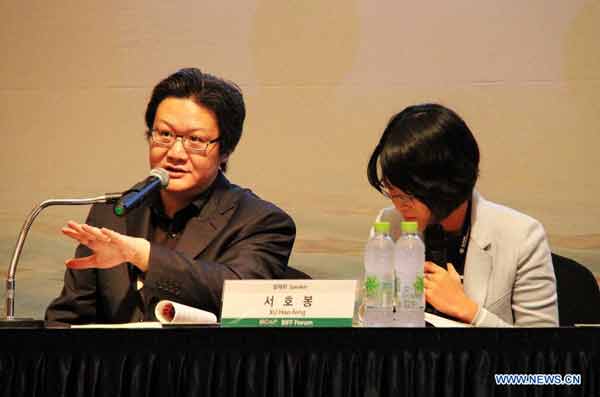Asian cinema on demand
By Kevin Ma
Fri, 15 November 2013, 16:30 PM (HKT)
Ancillary Feature

Thirteen years ago, Crouching Tiger, Hidden Dragon 臥虎藏龍 (2000) set a box office record for an Asian film in North America, grossing US$128 million. While the success of Ang LEE 李安's martial arts film has not been repeated, Hero 英雄 (2002) (US$53.7 million), Fearless 霍元甲 (2006) (US$24.6 million), Kung Fu Hustle 功夫 (2004) (US$17.1 million) and House of Flying Daggers 十面埋伏 (2004) (US$11.1 million) can each be considered successful foreign films in the North America market.
But the days of large theatrical grosses for Asian films in North America may have come to an end.
The highest grossing Asian film in North America last year was Indonesian action film The Raid Serbuan maut (2011) which made US$4.1 million, despite heavy media coverage and strong word-of-mouth. This year, despite opening on 750 screens – considered a major release for a foreign film – and an extended promotional campaign that included an appearance at ComicCon by director WONG Kar-wai 王家衛, The Grandmaster 一代宗師 made only US$6.57 million in North America, representing 10.5% of its worldwide gross.
Yet the demand for Asian entertainment hasn't necessarily diminished. Consumers can now easily obtain the latest Asian films online, and distributors are scrambling to shepherd that audience with new business models. While some distributors have opted to target the diaspora audience with day-and-date multiplex releases, others are making use of new release platforms.
Breaking out of cinemas
In the United States, foreign films are often relegated to arthouse cinemas, regardless of the genre. These films usually open in limited release, starting in the major cities before slowly rolling out across the country. In the past, the wait for a North American theatrical release may be a year or more.
The exception to this rule was the so-called Chinatown cinema circuit. Located in major cities with large immigrant populations from Hong Kong, such as Vancouver, New York and San Francisco, these cinemas carried the latest Hong Kong films on a day-and-date basis. As the Hong Kong Diaspora audience began to rely on home video, Chinatown cinemas virtually disappeared.
Globalisation — and the internet — has helped spread the exposure of Asian cinema to people around the world and driven audiences' desire to get access to the latest Asian films immediately. Meeting that demand has become easier than ever, thanks to access to parallel imports and illegal downloads.
That demand has also spread the Chinatown cinema model to films from other Asian countries.
Indian companies like UTV Motion Pictures have been distributing Bollywood films directly to cinemas in the United States since 2004. South Korea's CJ Entertainment Inc CJ엔터테인먼트 – starting with its own CGV cinema in Los Angeles – began directly distributing some of their own films in the United States in 2009 and has since expanded to home video distribution.
Originally based in Australia, China Lion Film Distribution Inc also brought the day-and-date distribution model to the United States to take advantage of Chinese cinema's newfound success. However, opening on anywhere from just 7 to 150 screens, these films have had a difficult time finding financial success within the traditional theatrical release model.
Instead, Asian films have found a new life in the ancillary market. Parallel imports have affected home video sales, and the physical video rental market has shifted out of traditional video stores to services like Netflix, which now boasts more subscribers than HBO. While the increase in internet speed has helped made illegal downloading easier, it has also boosted the popularity of legitimate video-on-demand services.
In 2009, American distributor Well Go USA Inc began making a number of its Asian releases available digitally on demand in addition to home video. In 2011, the company experimented with day-and-date theatrical and digital release. This year, they took that a step further with their first "Ultra VOD" release – making a film available digitally before its theatrical release.
According to Well Go President Doris PFARDRESCHER, their decision for using an "Ultra VOD" release depends on various factors. For Drug War 毒戰, the company used the positive reviews to its advantage to build momentum for a traditional theatrical release. However, for Ip Man: The Final Fight 葉問 終極一戰 (pictured), Well Go decided to appeal to the genre's established fan base and used the "Ultra VOD" release pattern to reach a wider audience.
"Up to this point, we have been extremely pleased with the early results. One of our biggest fears was damaging our package media business (DVD, Blu-ray), which is still a critical part of our revenue, and so far this has not been the case," says Pfardrescher.
Ever since 2010, Asian Media Rights – founded by the former heads of Asian-American television station ImaginAsian TV – has been acquiring Asian films for their various digital platforms. In addition to home video and video-on-demand platforms on cable networks across the United States, the company also makes part of its 500-plus catalogue available for free on popular video site Hulu.
"It's our goal first and foremost to create the kind of awareness on our films that will allow us to crossover beyond certain segments of population and in order to do so, we need time, assets and talent, which often is not available to us when going out day/date with Asia," says Pfardrescher.
Hollywood online
In July 2012, Apple expanded the music and movies section of its iTunes store to 12 Asian counties, including Taiwan, Hong Kong and Singapore. Some Hong Kong companies also began making their films available on the store alongside the predominant Hollywood films. This is the first time Hollywood films were legally available digitally in several of these countries.
Currently, only 34 foreign films can be released in China under revenue-share basis, although additional titles can be imported without a revenue-sharing deal. Even if nearly all 34 of those revenue-sharing films are from the United States, each major studio can only release a handful of films each year in China.
This was a trouble Universal ran into earlier this year with Despicable Me 2. Even though the film is suitable for a family audience, its local distributor Edko (Beijing) Films Ltd 安樂(北京)電影發行有限公司 reportedly chose not to use one of its limited quota slots on the untested animation series. Similarly, Academy Award Best Picture winner Argo never received a theatrical release in China.
However, these films have since been available legally on Chinese video platforms like Youku Tudou, LeTV and Tencent.
In China, an average 2-D movie ticket costs around RMB35 (US$5.72), while the price of a legitimate DVD can cost anywhere from RMB20 (US$3.27) to RMB40 (US$6.54). As movie-going remains an activity for the middle class, those living in urban areas with low income often resort to extralegal means to see films.
Thanks to a deal signed by the studios and video platforms, Chinese audiences can now see some of the latest Hollywood releases just weeks after their theatrical release in the United States. While the bigger films require a fee or a monthly subscription, most older titles are available for free.
An internet release in China may only bring in a fraction of what a theatrical release can earn, but there are several advantages to this strategy.
Video sites need a large catalog of major releases to attract subscribers to their subscription plans, which means they are more likely to buy films in bulk. Instead of relying on ticket sales, studios can still bring in revenue for older catalog titles through these deals. Not only does this provide a new way for the studios to break into what will eventually become the world's biggest film market, it would encourage Chinese consumers to pay for legal content in the long run.
Theatrical releases in China have to go through the government's strict censorship process, but video sites are in charge of censoring their own content. While video sites do make self-determined edits to films for objectionable content like nudity and graphic violence, censorship on these sites tend to be far more lenient. Films like World War Z that had censorship difficulties in the theatrical market, are available online in China with minor edits.
Like the video-on-demand platform in North America, the long-term benefits of Chinese emerging video platforms are yet to be seen. However, as audiences embrace new ways to watch films, finding new forms of distribution to capture these audiences can benefit both consumers and content owners.




 Reply With Quote
Reply With Quote

















